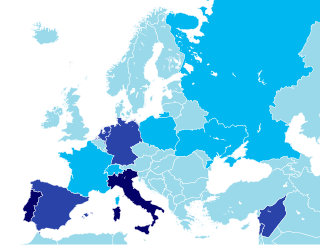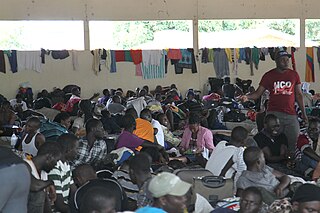Related Research Articles

The Diversity Immigrant Visa program, also known as the green card lottery, is a United States government lottery program for receiving an immigrant visa followed by a permanent resident card. The Immigration Act of 1990 established the current and permanent Diversity Visa (DV) program.

Immigration to Brazil is the movement to Brazil of foreign peoples to reside permanently. It should not be confused with the forcible bringing of people from Africa as slaves. Latin Europe accounted for four-fifths of the arrivals. This engendered a strikingly multicultural society. Yet over a few generations, Brazil absorbed these new populations in a manner that resembles the experience of the rest of the New World.

According to the French National Institute of Statistics INSEE, the 2021 census counted nearly 7 million immigrants in France, representing 10.3% of the total population. This is a decrease from INSEE statistics in 2018 in which there were 9 million immigrants in France, which at the time represented 14% of the country's total population.
Immigration law includes the national statutes, regulations, and legal precedents governing immigration into and deportation from a country. Strictly speaking, it is distinct from other matters such as naturalization and citizenship, although they are sometimes conflated. Countries frequently maintain laws that regulate both the rights of entry and exit as well as internal rights, such as the duration of stay, freedom of movement, and the right to participate in commerce or government.
According to the 2021 Canadian census, immigrants in Canada number 8.3 million persons and make up approximately 23 percent of Canada's total population. This represents the eighth-largest immigrant population in the world, while the proportion represents one of the highest ratios for industrialized Western countries.
Opposition to immigration, also known as anti-immigration, is a political ideology that seeks to restrict immigration. In the modern sense, immigration refers to the entry of people from one state or territory into another state or territory in which they are not citizens. Illegal immigration occurs when people immigrate to a country without having official permission to do so. Opposition to immigration ranges from calls for various immigration reforms, to proposals to completely restrict immigration, to calls for repatriation of existing immigrants.
Illegal immigration is the migration of people into a country in violation of that country's immigration laws, or the continuous residence in a country without the legal right to. Illegal immigration tends to be financially upward, from poorer to richer countries. Illegal residence in another country creates the risk of detention, deportation, and/or other persecutions.

Haiti has a sizable diaspora, present primarily in the United States, Panama, Dominican Republic, Cuba, Canada, France, the Bahamas, Peru, Ecuador, Colombia, Brazil and Chile. They also live in other countries like Costa Rica, Mexico, Bolivia, Guatemala, Nicaragua, Honduras, Venezuela, Argentina, Barbados, Dominica, Suriname, Aruba, Guyana, Belgium, Switzerland, United States Virgin Islands, Turks and Caicos Islands, among others.

Immigration to Europe has a long history, but increased substantially after World War II. Western European countries, especially, saw high growth in immigration post 1945, and many European nations today have sizeable immigrant populations, both of European and non-European origin. In contemporary globalization, migrations to Europe have accelerated in speed and scale. Over the last decades, there has been an increase in negative attitudes towards immigration, and many studies have emphasized marked differences in the strength of anti-immigrant attitudes among European countries.
Immigration equality is a citizens' equal ability or right to immigrate their family members. It also applies to fair and equal execution of the laws and the rights of non-citizens regardless of nationality or where they are coming from. Immigration issues can also be an LGBT rights issue, as government recognition of same-sex relationships vary from country to country.
The visa policy of Canada requires that any foreign citizen wishing to enter Canada must obtain a temporary resident visa from one of the Canadian diplomatic missions unless they hold a passport issued by one of the 53 eligible visa-exempt countries and territories or proof of permanent residence in Canada or the United States.

The United States government holds tens of thousands of immigrants in detention under the control of Customs and Border Protection and the Immigration and Customs Enforcement (ICE).

Immigration to Venezuela historically has been significant. Because of the Venezuelan geographical location as a gateway to South America, this nation has been the plot for many newcomers, even taking place before Columbus' discovery in 1498 when many aboriginal inhabitants came and left Venezuela. After the Spanish colonization of the Americas brought European colonists and African slaves, immigration to Venezuela was significant particularly in the period after World War II, with large numbers of immigrants from Asia and Europe, particularly southern Europe. In addition, Venezuela shares a 1000-mile border with Colombia and has long had substantial numbers of Colombian residents. Since the 1980s, the Colombian conflict has seen largescale Colombian immigration, with Venezuela the number one destination for displaced Colombians.

A Haitian Brazilian is a Brazilian person of full, partial, or predominantly Haitian ancestry, or a Haitian-born person residing in Brazil.

Illegal immigration to Canada is the act of a person who is not a Canadian citizen or permanent resident entering or remaining in Canada in a manner contrary to the Immigration and Refugee Protection Act and its associated regulations. That includes persons who entered Canada on a travel visa but remained beyond the period of stay specified as well as persons who entered Canada without presenting themselves at a port of entry.
Illegal immigration in Chile is a phenomenon that largely began in the 1990s as a result of economic growth and political stability in Chile. Most immigrants are South American, with the largest wave being Peruvian, although there has also been a significant amount of migration from the Caribbean. Illegal immigration is primarily caused by a lack of security or economic opportunities in the country of origin.
An illegal immigrant in India is a foreigner who has entered India either without valid documents or who initially had a valid document, but has overstayed beyond the permitted time, as per the general provisions of the Citizenship Act as amended in 2003. Such persons are not eligible for citizenship by registration or naturalisation. They are also liable to be imprisoned for 2–8 years and fined.

Immigration policy, including illegal immigration to the United States, was a signature issue of former U.S. president Donald Trump's presidential campaign, and his proposed reforms and remarks about this issue generated much publicity. Trump has repeatedly said that illegal immigrants are criminals.
Federal policy oversees and regulates immigration to the United States and citizenship of the United States. The United States Congress has authority over immigration policy in the United States, and it delegates enforcement to the Department of Homeland Security. Historically, the United States went through a period of loose immigration policy in the early-19th century followed by a period of strict immigration policy in the late-19th and early-20th centuries. Policy areas related to the immigration process include visa policy, asylum policy, and naturalization policy. Policy areas related to illegal immigration include deferral policy and removal policy.
Joe Biden's immigration policy initially focused on reversing many of the immigration policies of the previous Trump administration, before implementing stricter enforcement mechanisms later in his term.
References
- ↑ "Rising Brazil tackles immigration question". CNN . Retrieved 2012-04-01.
- ↑ "Brazilian city admits 500 more illegal Haitian immigrants". People's Daily . Retrieved 2012-04-01.
- ↑ "Brazil announces plan to rein in immigration from Haiti". Los Angeles Times . Retrieved 2012-04-01.
- ↑ "Booming Brazil lures immigrant workers". CNN . Archived from the original on December 23, 2011. Retrieved 2012-04-01.
- ↑ Garcia, Raphael Tsavkko. "How Brazil's progressive migration bill was sabotaged". www.aljazeera.com. Retrieved 18 June 2017.
- ↑ "In 10 years, number of immigrants increases 160% in Brazil, Federal Police says". G1 (in Portuguese). Retrieved 16 November 2017.
- ↑ Senegalese who requested refuge in Brazil will have new procedure to obtain residency authorization, G1, 6 December 2019. (in Portuguese)
- ↑ Rulings, Ministry of Justice of Brazil. (in Portuguese)